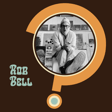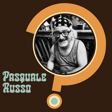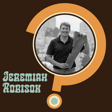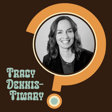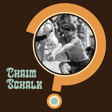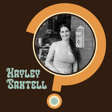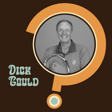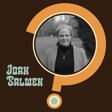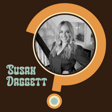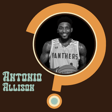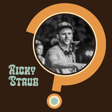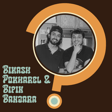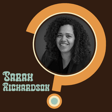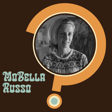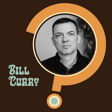Become a Creator today!Start creating today - Share your story with the world!
Start for free
00:00:00
00:00:01

Episode 22 - Justin Hoot
Justin Hoot is a partner at Someoddpilot, a creative agency for brands like Patagonia, Lollapolooza, FX, and more. Justin shares about growing up as a kid with anxiety, east coast vs midwest vibes, and how he has been able to move on from one thing to the next without having his identity wrapped up in it. We talk about how quickly it feels that time is passing, and the tension between pursuing our own dreams vs being a dad.
Follow Justin on Instagram @jhoot__
Transcript
Introduction to the Show and Guest
00:00:11
Speaker
Hello and welcome to What's Next. My name is Joel and this is my show. Today is my conversation with Justin Hoot. Justin is a partner at Some Odd Pilot, which is a creative agency that does really impressive work for brands like Patagonia and Saucony, Lollapalooza, FX, just to name a few, but a lot more brands that you've heard of.
00:00:34
Speaker
Justin and his wife and his kids have been longtime friends of my family. And Justin, when you first meet him, he's one of those guys who is a mixed message, which I really love about him. At first glance, he's this artistic tattooed from head to toe, kind of edgy guy. He's definitely cooler than I am. But the real truth about Justin is he's one of the kindest people I know. He's incredibly welcoming. He's always finding the positive in things.
00:01:02
Speaker
And for the duration of our friendship, he's always seemed to have a plan for his life. He's always seemed to be thinking about things strategically as he makes decisions for what he's going to do next.
Justin's Life Approach and Journey
00:01:13
Speaker
And I wanted to talk to him about that approach to his life, talk to him about how he got to where he is now as a partner at Some Odd Pilot. So please enjoy my conversation with Justin Hoot.
00:01:28
Speaker
Hey, boys, I'm recording a podcast, so could you guys try not to scream and stuff? Thanks. Dude. Hey, what's up? How's it going, man? Good. How's it going with you? Good. That's hilarious. I love your backdrop. That's good. Yeah, dude. High quality. Same thing happening. And hey, is the audio OK? Yeah, it sounds OK. Do you have headphones, though? Not great ones. That's OK.
00:01:58
Speaker
It's just there's an echo. Shit. Hold on one second. Let me see what I have. All right. So you've got Star Wars and I've got children's headphones. Let's see how this goes. Good thing it's not video. I was going to say, I'm assuming this is not video. No video. All right. How's this? Is it much better?
00:02:16
Speaker
Yeah, I feel like we're on even playing fields now. We're good. Now we're right in it. Yeah. I think so. I'm good. Are you good?
Reflections and Humor in Podcasting
00:02:24
Speaker
I'm good. Although I've been listening to a lot of your podcasts in advance of this podcast and Jesus, dude, you got a lot of people that have done really cool things. I hope not the CEO founder of anything, but this will be a fun conversation.
00:02:37
Speaker
It's all punching up for me. Living a good life, you know what I mean? So what's going on? You're at home this morning? Yeah, I'm at home this morning. You look like you're in like a Mad Men era office.
00:02:50
Speaker
You know, we bought this house in 2021 and it's a 1960s mid-modern home. And this room was just like so granddad. It's like wood panel, like real wood shelves, like really like heavy duty, you know, each of them weigh like 15 pounds. And then we just like didn't have the heart to touch this room. It's pretty cool. The wallpaper is like a fibrous, like,
00:03:18
Speaker
a fibrous thing. I can't even describe it. They don't make it anymore. It's so practical, but it's perfect for this. Oh, that's great. Do you have a home office in?
00:03:29
Speaker
Yes, Sarah, nice to share this office. It's a little respite for us to do some work in, but we need to. Do you normally work on weekends or do you normally have weekends off? When I do work on the weekends, if I'm doing any professor, adjunct marketing, professor work, I'll do that on the weekends. Also, if we're busy or behind the work, we'll catch up a little bit, but try to keep it to...
00:03:54
Speaker
The older I get, the more I try to keep the weekends kind of sacred. I'm sure you do as well. As much as possible. So wait, you teach?
Career in Marketing and Education
00:04:04
Speaker
I pick up a course a couple of times a year. I'll do an adjunct graduate course for WVU. I'll teach the next generation of marketers. They're usually like eight-week sprints.
00:04:15
Speaker
WVU, what's? West Virginia University. Oh, okay. So you're doing it online? Yeah, yeah, yeah. It's all online. Yes, absolutely. It's all online. Yeah, I don't have time for it otherwise. But it's like async learning. So a lot of it is, you know, I'll send out like a prompt or an assignment on a Sunday. You know, there'll be a blog post or something to engage with at the midweek part that I'll do after hours. And then there'll be some papers to grade again on the weekend. Okay. Yeah. So dude, you are an expert. You're a professor.
00:04:44
Speaker
I picked up, you know, I'm sure we'll get into this, but I stopped drinking in July of 2019. And then within like minutes, I was like, I'm getting a master's degree. So, signed up for a master's program and then COVID hit and it was like, well, we're in this, so we're gonna work like nothing else to do. So yeah, here we are.
00:05:07
Speaker
Wow. That's amazing. So when did you finish the master's program? 21, 21. Okay. And you just did that all online while, while working. Yeah. Online while working while raising children's, you know, somebody said something once and it's kind of stuck with me, but just that like, uh, advertising is like half a career. And when I look at my industry, I look at this industry, there's not a lot of like old people and it's, and I think that's kind of by design. You know what I mean? I think if you're going to like be a cultural,
00:05:37
Speaker
or speak on culture, you've got to really be connected to it in a big meaningful way. And I just think that your priorities change. I mean, I just think about all the entertainment and whatnot and things that we would consume when we were younger to see the energy for it. And then your priorities really shift. The second you kind of have those kids and whether you want to or not, you just can't really
00:06:01
Speaker
participating culture the way you can when you're younger. And I think that reflects at a certain point in advertising and marketing. Anyway, master's degree is a retirement plan. So when
Life Changes and Career Alignment
00:06:15
Speaker
I'm done marketing, it'll be time to sort of find a college town and share my experience with the next generation. Then you can teach. Yeah, exactly. Oh, wow, OK. Wow, that's cool. What was your master's in? I got an MS in integrated marketing.
00:06:31
Speaker
Okay. Yes, and I'm debating about getting a PhD in it. Oh, really? Yeah, just so that anyone ever needs a doctor, I can say that I am one. Yeah. We got a doctor on the airplane. Yeah, but just of marketing. But yeah, so there's these things I'm batting around for to kind of further bolster that retirement plan. So we'll see. Cool. Yeah, man. It sounds like you're in the right role because I know that what you do is strategy
00:06:57
Speaker
And thinking about brand strategy and how to best use a brand's voice to grow their business and stuff. Yeah. Sounds like you're doing that with your life. You have a strategy that you're playing out. Yes. Something like that. Just to clarify, I'm the person that gets a lot of the people in the rooms to do the strategy work. OK. But I am kind of on the front lines of understanding a client's business and understanding how we might solve some issues that they have with marketing.
00:07:25
Speaker
and rallying the team around that to do so. So that's sort of, that is, that's my day to day, but it is, it is about short-term wins and long-term leaning looking stuff. So that's, I think, I think that's, you know, that's kind of where I'm at with my life and what can I do today? What I want to do 10 years from now? What can I do forever? You know?
00:07:42
Speaker
Have you always been that way? Um, no, uh, you know, it's, it's been an evolution, I think. And, um, I'm really grateful, uh, to have had the opportunity to become a father. I think that's really helped me solidify a lot of, you know, my purpose and like my drive.
00:07:59
Speaker
Yeah. Yeah. You know, but before we get into all that stuff, man, I just have to tell you, I just, I had this, this thought the other day, um, you know, my, I got a grandmother, my father's 71. Um, my grandmother is turning 90 next week. Oh, wow. When you just like think of that in terms of decades, you know, that's like, you know, he's been doing this for seven, she's about to crack nine decades. And those seem like really big, um,
00:08:24
Speaker
long stretches, right? And then all of a sudden, you know, you and I caught up the other day when you invited me to do this and just catching up on life. It dawned on me that you and I have known each other for a decade. Have we? I guess so. I met you before Rumi was born. That's right. She's just turned nine. So like, I'm just like, oh my God, like, wow, these stretches feel huge. They go fast. You just blink, man. Yeah.
00:08:47
Speaker
We've known each other for 10 years. It's crazy. That is crazy. It is crazy. I honestly have a really hard time. That just kind of fucks me up emotionally all the time. I just feel like I have existential crises like every other week because times
00:09:04
Speaker
Yeah, time's just moving insanely fast and there's this feeling that life is slipping away constantly.
Podcast Motivation and Intentional Living
00:09:12
Speaker
And one of the reasons, you know, kind of behind this podcast is partially that is that like, how do we make this thing as good as it can be?
00:09:21
Speaker
as intentionally as possible and and like man when I look when I look at the evidence of my life like I'm just not that I'm not that good at that I need to hear I need I want to hear from other people how they're doing that because I don't want to be entering my ninth decade and have a bunch of regret that I didn't try stuff or I didn't you know believe in myself enough or that I
00:09:44
Speaker
you know, had too much fear or too much whatever. So it's crazy. I mean, I was thinking about that as well, you know, like we used to walk across the back alley and like that's how, that's where we met. I mean, I think Sharon and Sarah Jean knew each other, right? They did. They worked a wedding together. Yeah. Yeah. Yeah. I also just wondering like, you know, Sharon and Tony, who I care about deeply. And I just, how many people do you think they've connected?
00:10:13
Speaker
They're definitely connectors. They really are. I'm very grateful for that friendship, but also the friendships and the people they brought in our lives, including you guys, you and Mo and Luca and Wynton. It's been cool. Yeah, it is really cool. It is really cool. Yeah, we shared an alley. That's how we met. We did.
00:10:33
Speaker
I've driven past there a few times, because our office is still not too far from there. We're in Oak Park now, our office. So whenever I'm back, I typically stay at Mo's parents' house, which is Riverside and Oak Park. So Forest Park's right in between. So I'll sometimes drive through there. And it just immediately kicks in one of those existential crises of how much time has passed and how so much has happened and so little has happened.
00:11:03
Speaker
Yeah. I'd love to hear a little bit about sort of just your journey to how you got to where you are now.
Justin's Background and Family
00:11:09
Speaker
Yeah. In thinking about this conversation, preparing for it. You know, there's a lot about your story. I don't actually know. Yeah. Like, where did you grow up? What part of the country, you know, like, what was family life like for you as a kid? So I grew up, I was born in West Virginia.
00:11:26
Speaker
in a town called Morgantown, and then we moved to Arizona for a minute. I think we left the East Coast when I was about one or two, moved out to Arizona for a couple years, and I think we were back in Pittsburgh by the time I was four.
00:11:41
Speaker
Were you the oldest? I'm the oldest, yeah. So total 80s, baby. I think I'm like the first millennial. If you look at the age range, I'm like the earliest age or year you can be born. What year were you born? 81. 81, okay. So I'm like right there, kind of on the cusp of like a Gen X millennial, you know, kind of growth trajectory. But yeah.
00:12:07
Speaker
Basically, for all intents and purposes, I grew up in Pittsburgh for the most part. We moved around quite a bit. I'm the oldest of four. My parents had kids about every four years, so there's quite a bit of distance between myself and my youngest, about 13 years. We grew up in a suburb about 30 minutes north of Pittsburgh.
00:12:30
Speaker
I don't know. Pittsburgh is an interesting place. The East Coast is an interesting place. I would say I grew up pretty anxious. You did. I've always had a voracious appetite for life. But I also had quite a bit of insecurity. And I don't know. It took me a long time to find my footing, I think, with friends and with things that I wanted to do. Yeah. What did your parents do?
00:12:55
Speaker
So my dad is a quality control specialist for a large print company that my, my mom's family actually owned. Oh wow. Yeah. And so they're responsible for a lot of like mass mailers for programs. They've got like a, like the salvation army is one of them. They like long standing clients. They'd be responsible for like sending out the renewals for like national geographic stuff like that. Okay. And it was a print business that my grandfather built.
00:13:22
Speaker
Took over from his father and then built up to what it was and that was like a big business Yeah, yeah, and so they had a really really fun, you know Funness to the really functional company where they did a lot of printing produce a lot of work And my dad became a quality control person over there and my mom You know Raised us was primarily what she did and she had a couple different jobs in between that, you know kind of made her happy and fulfilled her
00:13:50
Speaker
But I would say her biggest task was raising us. And there was a lot of us. So it was quite a lot. Were you creative as a kid? Were you into sports? It was more sports. I dabbled a little bit in writing, but it was more sports growing up. I wrestled quite a bit. And then I moved into football when I was a little older. I was much better with the lack of finesse skill sports and more of the point in the direction, physical contact.
00:14:16
Speaker
take somebody down. Yeah, that kind of stuff. A little simpler. But I was never going to be a soccer player, never going to be a basketball player, never going to be a hockey player. But that's what I did a lot growing up. And I think I was 17 when I picked up a guitar proper. Oh, really? OK. Yeah. And I think I've been at a friend's house and is playing music. And I was like,
00:14:38
Speaker
I could do that. I think I should do that. And that kind of pushed me into music. Just because you thought it was like a worthy endeavor or because the people that were doing it were super cool and you wanted to be cool too? I don't know if that's a cool factor. I think it just, you know, I mean, obviously that I think, you know, I think
00:14:55
Speaker
100% for me. When I started playing guitar, it was literally because I was air guitar-ing in the mirror. And I was like, that looks cool. I should do that for real. Totally. And I think anybody that approaches it outside of incredibly incredible musical geniuses, there's an ounce of vanity to it. You know what I mean? There's not that. But I don't know. I think I wanted to
00:15:23
Speaker
It's kind of interesting. I moved through things in my life and I kind of make peace with them and I let them go, which I think is like I played football and I played football for a year in college. Oh, you did? Okay. Yeah. And then when I was done, I was just done. And when I put that down, I picked up a guitar and I haven't thought about it twice.
00:15:42
Speaker
I've never been like, oh, the glory days and it was this and it was that. It's sort of like this thing that I did that meant a lot to me. And then I sort of just like say goodbye to it, you know? Music then I think was sort of that next thing that I did for a decade or so, you know, playing, you know, in bands in Chicago. And I put that down too when I was kind of ready.
00:16:00
Speaker
So I didn't really know this about you that you had a serious musician era. What I knew was that you sort of were in more in like band promotion and stuff like that. No, yeah. So, so, yeah, so I grew up in Pittsburgh.
Career Moves: IT to Chicago
00:16:12
Speaker
I actually went back to school and I went to a small town on a football scholarship for one year in a small college. I quit, moved a bit, a proper university, Western University, where I did undergrad. Okay.
00:16:24
Speaker
I moved to Washington DC for six months on a whim to become a recruiter. I played music all through college. Like a recruiter for college? No, like a recruiter for IT people. Oh, okay.
00:16:37
Speaker
I worked for what I can only describe as like a boiler room. Have you ever seen the movie Boiler Room with Giovanni Ravisi? I worked for a company that modeled its business off of that. It was like young men and women wearing bad dad suits. And it was just like super intense, like six 30 star times. Your life is your job. Yeah. And I just, you know, I couldn't stand Washington, D.C. It was just not fun at all.
00:17:01
Speaker
And I had an opportunity to take a promotion in DC or open a Chicago office. And I said yes to Chicago's site Unseen. I was like, anything to get out of here, yes, let's go. So you were like 22 to 23? 22 to 23, yeah. So we had a lot to cover on.
00:17:18
Speaker
in high school and college, I was a cook. So I also- Really? At restaurants? Yeah. So I had this moment post-college where I almost was going to be a chef. Oh, man. I could see that. And my mom was like, hey, dude, you didn't just go to college for four years to do what you could do on a two-year program. She was like, you're not going to be a chef. And I was like, you're right, mom. I'm not going to be a chef. So I let that go. OK.
00:17:45
Speaker
Pretty quickly thought I'd enter the corporate space as a headhunter, recruiter. I'm playing music through all of this, sort of like dabbling in that. And what I found when I came to Chicago was like,
00:17:58
Speaker
All of this East Coast energy sort of like went away, like in a dramatic way. And I've found this over, over just like living, but like, I think as you move West across the country, things just like chill out pretty dramatically, like every time zone, you know. Do you like that?
00:18:16
Speaker
I, well, I didn't know what to do with it. So like I got to Chicago and I was like, I'm ready to go. I'm ready to like, you know, fill, you know, ball of East coast energy. And then people I started playing music with started to be like, Hey dude, you don't have to have a job that you started six 30 in the morning. And I was like, really? And they were like, yeah, like you can live your life. It's like summertime in Chicago. You should be out three, four or five nights a week. You should be like,
00:18:43
Speaker
indulging in, you know, this place and these, this town and, you know, nightlife. And, you know, so it just sort of like way on me that I maybe had made the wrong career choice. Yeah. Interesting. Did you, did you meet those people you were playing music with? Just how, how did you meet them? Did you have, did you have some people that you knew in Chicago already? No, I moved here without knowing a soul. Um, wow. And, uh, I've met these guys through, um, open mics, a couple of guys that I'd started just like open miking to get out there and like see the scene.
00:19:11
Speaker
So you had enough, were you playing your own songs at Open Mics? A little bit of both. I probably had at that point a half a dozen to a dozen songs that were mine and then just open mics for an opportunity to play other people's songs and try out some different vocal takes and hear other people.
00:19:31
Speaker
You know, it's obviously can be super cringe too, but, you know, I kind of found like a good group of guys. And what we actually did is we took that open mic model and we actually just started hosting kind of like roundtables. And so we kind of built our own little following. So we'd show up, you know, like three or four musicians.
00:19:47
Speaker
as part of an open mic that had like a guaranteed draw, and then we'd open it up to like two or three other like featured artists. So we sort of took the open mic thing that we had met through and sort of just like turned it into like a booking, you know what I mean, for us to book, a tool for us to book rooms. Yeah, that's cool. And that led me to wanting to be in a band and meeting these guys. I auditioned for a, I auditioned to join a band as a lead singer and, um,
00:20:15
Speaker
They iced me for like two weeks. And then they were like, hey, you should be in this band. And I was like, all right, I should be in this band. Yeah, I know. I know I should. Yeah. And so that was like 2006. And I started my run in a band for the next four years. Dude, I had no idea you were a frontman doing these open mics. So what type of music was it? What was the band called? I'm not going to say that on air.
00:20:41
Speaker
It's findable, we can find this music if we really want. You can hunt it out of it. How do I describe it? I would describe it as somewhere like a blind melon meets modest mouse. Oh, okay. Like a little bit introspective, a little bit, am I proud of it? There's moments of certain songs that I'm really proud of. There's other stuff that I'm like, I have this problem
00:21:02
Speaker
As a songwriter, which my wife does not have and other songwriters that I respect don't have, I have a really hard time putting myself in someone else's shoes and writing from a place that isn't my own. And I kind of got like really tired of having to be in a bad place to like write. It's just like, it's like very self-destructive.
Music Career and Creative Ventures
00:21:21
Speaker
You know what I mean? Like I was like, I had to like live the angst to sing about the angst. Now that maybe like pain equals art is good for like,
00:21:29
Speaker
a minute, you know, doing that for like half a decade, you're like, am I even this angry anymore? Like what am I, you know, can I even go back to the place that I was when I wrote that song? So you were not just hired as a singer, you were a songwriter too. Yeah, myself and the other guy in the band, Ryan, we sort of like had a really nice, for a time, had a really nice like songwriting kind of dynamic going, you know, he'd start with a line or a lick and I'd kind of come in and we really just like fed off each other and we were roommates.
00:21:58
Speaker
Um, bands are funny, you know, I, um, cause I got into managing bands and having an opportunity to put some space between my, myself and music, just like looking at like what a band is. And it's like, every band sort of has a golden hour. And it's when like, no one has kids, no one has any other outside interests and you can all just like move as a unit for like a time. Just fully focused on the, on the project.
00:22:23
Speaker
Yeah, everybody's priorities are the same. Everybody's interests are the same. And I feel like if a band can make a living in that golden hour, you have a band.
00:22:33
Speaker
if you can't make a living in that golden hour, just like life really quickly gets in the way. And that's ultimately what happened with us. But we had a really nice four year run. We put out like an album and a half. At one point we were doing like 50 shows a year in the region. So we would do like runs, Ohio and to Pittsburgh, up in Wisconsin, Milwaukee area, and then just all over Chicago.
00:22:58
Speaker
And this was your full-time gig at the time, or were you working? No. It's all Weekend Warrior stuff. OK. Yeah. And I was peppering that stuff in with, again, being a headhunter. I moved out of accounting or IT into accounting and finance. So this was all just Weekend Warrior hobby stuff. OK. And then you sort of burned out from it, feeling like I can't. I've got to do something else? Well, I started a business kind of at the same time I wound up in my band. And that became my life. I started this business called Vyoba.
00:23:27
Speaker
So my friend once, two things really got me out of music as a professional. My friend once described himself as a better coach than a player. And I was like, huh, that might be what I am. Maybe I'm like a better coach than a player. That kind of got me thinking. And then I had this other friend in one of these weird moments. I was asking for advice and he was like, you know, Justin, I think your ambition is beyond your talent. And I was like, oh, what's up?
00:23:56
Speaker
It's a backhanded compliment. And I kind of sat with that like, are we friends? Is that what you say to a friend? But then the more I thought about it, I was like, man, that's a nice thing for a, that's a true friend. To be like, you know what, man? I love you, I'm here for you. But I just got cards on the table. And I think both of those things made me kind of realize that while I had a passion for this, maybe I had some skills to offer somewhere else. So how old were you at that point?
00:24:25
Speaker
I was 28, 29 when I started Vyoba with a friend of mine. I got out of headhunting and recruiting at that point fully. We did a startup. We had an angel investor. We raised a ton of money and started to launch a business in a year. It was a service package for bands, record labels, and management companies.
00:24:52
Speaker
I kind of pivoted out of that thing that I'd done as an independent musician trying to lead my independent band and said like, Hey, this sucks. What if I made it easier for independent musicians, you know? Was it like the internet was kind of becoming a thing that was making that easier to do?
00:25:05
Speaker
Well, easier and then immediately harder. So we launched this on the verge of Spotify. And so this is like 2010. So within minutes, Spotify was like nipping at our heels, streaming came in in a big way. Yeah. How do you compete? Yeah. Yeah. And I think the thing that we realized too late and it was interesting cause I had some like major label clients, you know, um, the meat puppets were a long time client of mine, very wonderful people who I still love to this day.
00:25:32
Speaker
Did you work with bands all over the place? Yeah, all over the place, all over the place. But again, I think what we realized too late was that while there was a ton of independent artists, they only had a very limited amount of money.
00:25:45
Speaker
So just like the cycle of trying to get 5,000 bands to spend $200 is really challenging versus like finding 100 bands to spend $5,000. So just like that kind of dichotomy, I think we were a little bit in over our heads in terms of underestimating and overestimating the market at the same time. So that ultimately led us kind of not being able to have much of a business.
00:26:13
Speaker
So how long did you run that for? Two and a half years. But I would say this, every good thing in my life since then was because of that. I actually met Sarah while we were sponsoring a carnival at South by Southwest. So that's where Sarah
Personal Growth and Relationships
00:26:31
Speaker
and I met.
00:26:31
Speaker
Was she in a band there? She was on tour doing a Chicago showcase, and that's where I met her. Oh, that's crazy. I had no reason to be down there except for this business venture that I was running. You're both living in Chicago, and you meet in South by Southwest. We were living like six blocks away from each other in Chicago. No way. Yeah. That's crazy. So like all the good at a bar called Paradise, no less.
00:26:53
Speaker
All the good things in my life professionally have happened from taking that chance and switching careers that I was already five, six years into. Did it feel risky at the time? Did you have a hard time deciding if you should do it or not? I think my parents were incredibly freaked out. I forget how much difference
00:27:20
Speaker
Are we like five years apart, six years apart? Yeah, I'm 30, how old am I? I'm 38, 38. Okay, cool. So we got about four years. I don't know where you were in 2008. You're probably still kind of wrapping up college maybe.
00:27:33
Speaker
I was getting married, actually. I didn't go to college. I did everything backwards. Got married too young. Cool. I just moved to the US, actually. OK. So to 2008, when the financial crisis really came in in a big way. Oh, yeah. I remember that. Yeah. Yeah. Until then, growing up, my parents were like, one job, 30 years, you get a watch, then you retire. Yeah. My parents, too. Yeah.
00:28:01
Speaker
And that's sort of like the prevailing wisdom, right? And I think like 2008 taught me and a lot of people that I know, like they're just like, no one cares about you in that like way. You know what I mean? That thing you're brought up to believe that ideal just wasn't real, you know, at all. And so I quickly got comfortable and a lot of guys that I knew got comfortable and guys and gals that I knew, like just like really making like big pivots and like
00:28:30
Speaker
taking bigger chances because it's like, if this can all get pulled out from under us, you might as well do something that you love and care about, you know? So while it was risky, I just like, I didn't know what else, it's like, I certainly wasn't going to go work a job I hated, you know? So it was a lot of work and it was really hard, but it was, it was risky.
00:28:47
Speaker
I got more of an education than I did in college. And I met some lifelong friends. I met my wife, you know, and I really, my wife led me to my current job now. And, you know, it's one of those moments that are so serendipitous, but also just like, I just, you know, all that stuff is like really taught me just like to be open and to have faith and to just like not be afraid to take that chance. And I, you know, when I teach students, that's something I try to tell them to like, have all the plans in the world, but just like, keep it, keep a sliver open for,
00:29:17
Speaker
a chance. Don't be afraid to just grab onto something because you just don't know. You've got to have a little bit of faith. Faith in what? If you're open to taking a risk that good things will come? I think it's just faith in yourself and I think it's just faith that it's all going to be okay. Again, I want to be clear that's a much easier prospect in your 20s, unmarried, less responsible for other people.
00:29:47
Speaker
That's why I think it's really good advice for – I think you can do it as you're older, but for young people, it's really like you come out of college and you're like, I think I'm going to be an accountant or I want to be an accountant. Well, that's cool, but maybe also keep an eye out because there's nothing that would prevent you from making a big shift at any point. But for those of us that have more responsibilities too, I think it's good advice.
00:30:11
Speaker
The control factors have to be a little more than the safety nets need to be there. The consideration has to be higher. Yeah. Even on this podcast, I've certainly talked to a few people that were able to do some really cool things as they were older, but it's because the safety net is intact. Totally. Your mileage may vary on all that with people. That's where the comfort level comes in. How much comfort do you have in discomfort?
00:30:38
Speaker
Yeah. So I'm curious, as you're talking about all these various things you did, like sports as a kid and then some writing, then you put that down, you immediately transition to music, you do music pretty intensely and focus for several years, then quick pivot, put that down, pick up the next thing and you're all in. I'm curious if you experienced this in a similar way to myself, which is
00:31:07
Speaker
I'm similar to you in that way. I don't do hobbies very well. I just focus on one thing and I think a huge reason for that for me is because I get a lot of my identity out of the thing that I'm doing.
00:31:24
Speaker
and I feel that's kind of what I'm living for in a way. And a few years ago, I hit like a crisis point where it was like, this is really bad actually. I can't be living in a way where this defines who I am to the degree that it is. So I'm curious for you, do you think that's what helps you set stuff down and pick stuff up? Because you can sort of picture yourself as like, okay, this is who I am now.
00:31:48
Speaker
Yeah. I think, you know, I think, I think what you're describing that a couple of years ago is like, you know, probably a really normal thing for someone in their early thirties, you know, that's kind of this like, but, but I, but I will say, I will say, I certainly have gone down the road of defining myself by the things that I've done.
00:32:03
Speaker
But I've also, life has sort of taught me or I sort of have realized that like, you can be a lot of things and you can do a lot of things and there isn't some narrow identity, you know what I mean? You're gonna have a lot of good stories to tell people, your grandkids, you know what I mean? I'm gonna have a lot of good stories to tell the grandkids, you know? So I think like, I think that identity piece is really like, you can be bigger than the one thing that you do and you can encompass a multitude of worlds, you know?
00:32:28
Speaker
Well, and that's the hope. My life, objectively, I think people would say, oh yeah, that's pretty cool. You've done some cool things. But sometimes it is so narrow, I don't even remember. I don't even remember the stories to tell.
00:32:44
Speaker
feeling of the present can be so overwhelming that the bigger story is non-existent because of how heavy the present can feel. Totally. Well, I mean, you know, Joe, what I know about you and what I know about your background, I mean, you know, I think you're like a really introspective guy and I think you spend a lot of time, maybe it sounds like to your detriment, overthinking a little bit. Yeah. Oh, yes. Big time. Big time. Totally. But I mean, you know, I think that's, but I think that's
00:33:12
Speaker
I would suggest leaning into that because I think when you get to the other end of it, one of the two things is going to be, it's going to happen. You're going to just be so exhausted that you have to change. Um, or you just, you find, you find the center and you're like, okay, cool. I've made it all the way through. I've found, I've like, I've thought myself into the middle and now I can, now I can, you know, I've been there. I know where, I know where that leads me. You know what
Career Risks and Opportunities
00:33:34
Speaker
I mean? So I've really just, you know, for me, I look at it like, I think I've just always had like a voracious appetite for,
00:33:41
Speaker
life and trying things and the way things make me feel and I think like certainly things felt good about competing in sports, certainly things felt good about being in a band, certainly things felt good about running a business and all that stuff and I just think
00:33:57
Speaker
I don't know. It certainly hasn't been easy always. I would never pretend that those are easy. It's an easy path, but it is certainly one that's, I think, kept me a little bit sane and happy. Yeah, for sure. Well, you seem to, as someone who I've spoken to over the last decade, you definitely have a perspective that I think is unique to my own in that the way that you think about things is much less like a trap.
00:34:28
Speaker
Your circumstances don't trap you. You're able to play things out in a lot of different ways and imagine things in a way that's freeing where you can find freedom and you can find ways forward. Totally. I certainly have had moments of being stuck and I think that's what I mentioned earlier, that faith comes in. Just like faith that it's going to be all right, it's got to work out. Otherwise, what are we doing?
00:34:53
Speaker
I think some people are in situations where it's a much more of a razor's edge, you know what I mean? So I think the stuff we're talking about is like, do I like my job? You know, do I have, you know, am I married to a partner, you know what I mean, versus someone that's not a partner, you know what I mean? And how do we, you know, so I think those all have opportunities to grow and change and positives, you know.
00:35:17
Speaker
Yeah. You mentioned having anxiety as a kid. How have you worked through that and sort of where are you at now with that? Do you know what caused it? Do you know the source of it?
00:35:30
Speaker
I don't know, actually. When I say anxiety, I think I had a lot of insecurities growing up. I think I was really insecure in myself. Pittsburgh is an interesting place to grow up and the East Coast in general, I found that growing up, and I didn't know this until I moved to the Midwest.
00:35:50
Speaker
When I moved to Chicago, the way that I would engage with people was by like giving them a hard time. And people would be like, you're really, you're really rude. And I'd be like, I'd be like, what are you talking about? I'm like, where I'm from, like the harder you make fun of someone is like, the more you care about them. And I was like, maybe that's not good. I still, you know, my best friends that I grew up with, you know, like,
00:36:17
Speaker
they would tell your worst secret in front of a room full of people as a way to be like, I love you, man. And I don't know how healthy that is in terms of for a young psyche, for someone that's maybe feeling a bit insecure. But I don't know. I think that stuff weighed on me a lot. I was very introspective. I remember having insomnia from the age of 11 onward. To now, even. Well, I think I've finally figured out what it is.
00:36:47
Speaker
I might have to Google this, but there's a condition where people that don't require a lot of sleep, and they could be up late, and they can sleep two hours, and it's like they slept eight hours. You're like the .01% of the population that can do that? Something. I don't recommend it, but it is what it is. So even now, you're that way? Yeah, even now.
00:37:08
Speaker
And I'm married to someone that requires like a solid eight, like a full eight. And I'm like an average like four to six. So again, I don't recommend it. There's a lot of downtime in that. Nights get very long, but yeah. If I can get to sleep, I can sleep. If I can't, that's when I'm up. You know what I mean? I don't know. Do you have any of that stuff at all? I mean, kids are a whole other
00:37:32
Speaker
Yeah. I mean, yeah, I've never had a hard time falling asleep. Like I've tried to be somebody who can just get up in the morning super early and then they can get like two hours of work done before. And I like before kids, I could not do that. It was not possible. Now I can do it no problem because I have to.
00:37:50
Speaker
And I guess to answer your question, I haven't really done anything to deal with the anxiety except live in it fully and like accept it, remind myself that it's not going to kill me. You know, and I think that like I've sort of like been able to quiet it by just saying like just just living in it. You know what I mean? Living with it. So yeah, I had an anxiety expert on the podcast and she was talking about how a huge factor in just helping actually process anxiety is is just allowing yourself to have it really is trying to tell you something.
00:38:19
Speaker
Typically and culturally anxiety has become something that a sign that something's broken. Yeah, and everybody has it It doesn't mean something's wrong with you. Yeah, it's just so let's just get curious about it Interesting a lot of the problems come from the fact that we think we have to stop it
00:38:34
Speaker
Yeah. I mean, is it kind of like, is it something, some ways that like your mental like heads up that like, that's a hot pan. Yeah, exactly. That's exactly. It's like an alert in your brain. It's an emotion. That's an alert that there's a future event that's coming and you're, it's alerting you of a potential negative outcome so you can like make an action to avoid that outcome, to get the desired outcome, you know, but it's a negative feeling because it's designed to motivate you.
00:39:02
Speaker
Right, the same way in the pain. Yeah, exactly. Interesting, man. I guess I've never really considered it that way, but that makes a ton of sense. I do think it's criminal, the amount of ways we try to medicate out of these uncomfortable feelings these days. Yeah, yeah. To numb, to numb, yeah. Okay, so how did you end up at some odd pilot?
Partnership at Some Odd Pilot
00:39:22
Speaker
Totally. No, no, no. Um, I wound up there. Uh, as I mentioned, Sarah, um, Sarah actually was a model for the owner of some odd pilots for a photo shoot that they shoot that he did for a band for like an album cover. Oh, okay. And so Sarah actually knew, uh, Chris, I can see her. And right before we got married, they needed, uh, they needed some models for a photo shoot and tell you're right for Meryl shoes. Okay. And, um, Sarah shoes.
00:39:50
Speaker
Yeah, Sarah and I went over there to meet them and just like to say, hey, and to see if they needed two models. Turns out the sample sizes are like eights and nines and I'm definitely like a size 12. So I wasn't going to be able to go on the shoot, but Sarah went. And while this is, yeah, it must have been like 2010.
00:40:13
Speaker
And while Sarah was out in Telluride, they were like, man, we're kind of, we're growing. We sort of need someone that's like maybe a little more like accounting focused or client focused. And Sarah was like, have you met my husband? Have you talked to Justin about this? And they were like, and they're like, no, no, no, we should though. And so kind of struck up a conversation with them and they were like, this makes sense. And I was the fifth employee.
00:40:35
Speaker
And I worked there for two and a half years. I left to go do some work with my friends at the Uprising Creative. And then I kind of found my way back to them in 2019. The company's grown and changed considerably since then, but it's been a lot of fun. So I'm coming up on five years now.
00:40:52
Speaker
Yeah, that's amazing. The work you guys do is really impressive. You work with a lot of huge brands and do a lot of really cool work. You've become, since a partner, the process of joining a company, becoming a partner, and maybe this is partly just the getting older factor. There's not going to be too many more major pivots in your life before you become a college professor. Totally.
00:41:16
Speaker
You know, I, you know, when I when I joined up, I was 38 and this was the summer before the pandemic, you know. And so at that time, you know what I mean? I didn't I wasn't I didn't have any aspirations yet of anything. But, you know, working with these guys through the pandemic, watching how they handle the pandemic, watching how we grew as a company, how we grew as like a leadership unit really got me more and more excited over the years about like, hey, I think I might be home.
00:41:45
Speaker
I think I might have found my place and I mean I certainly have a lot of love for the two owners, Chris and Annika. They mean a lot to me personally and professionally and just really had an opportunity to grow a business together. It's been just incredibly fulfilling for me personally. But they made that offer to me and two other gentlemen about a year and a half ago.
00:42:08
Speaker
It was sort of a no-brainer at that point. And yeah, we don't have fully the future mapped out on what that means, what that all looks like. But I do know that I'm doing good work with people that I respect that have a lot of respect for me and care about me and not care about them. And I do think in 2024, that's kind of all you can ask for. I think there's a lot of bad bosses. I've had them. There's a lot of companies that don't care about you. I've worked at them. So yeah, it's worth the effort.
00:42:38
Speaker
Yeah. Do you feel like your sense of who you are in the work that you're doing, that you sort of feel settled in that? I mean, I do. We're in an industry where the Count Growth Partnerships place that I play in is sort of looked down upon as not a creative endeavor, but I really have
00:42:58
Speaker
I've built a career around being with people that kind of feel the opposite, you know what I mean? They kind of have a lot more respect for that kind of role, you know? And I certainly feel that I'm there with someone on pilot, you know? Do you view, like how do you view your role? Do you view yourself as a creative or do you view yourself as someone who's creatively doing your role?
00:43:20
Speaker
No, totally. It's a really great question, and I would never out now be like, you know, I'm a creative director. I have no aspirations to be a creative director. I don't know that, but I do think that I've got really good taste. I think I know what hits. I think I know what works for consumers. I also think, you know, my strength is really kind of like understanding what a business, very quickly understanding what a business is, how it operates, what it needs, and kind of like figuring out
00:43:45
Speaker
where marketing and where advertising and where branding could really help drive value for them. So in that way, I think it's creative. I feel fortunate to be at a place that we have big open room discussions on round ones where a lot of people put ideas in, you know, once or twice a year, an idea that I'll throw out there will get turned into something and that feels really good. But
00:44:06
Speaker
But just having an opportunity to kind of shape that, you know, to be the client's voice in the room with our team and just sort of figure out like, oh hey, this is going to hit. This is not going to hit. Oh my God, I love this. Can we dial this up a little bit or can we dial this back? But creative in that regard, but not like, you know, I'm not going to sit down and write a spot or anything like that. Yeah. Do you have specific moments that you kind of live for in terms of the work or the process or the outcome or what makes you really feel like you're doing what you're meant to do?
00:44:35
Speaker
Honestly, it's when I see the clients just be like, oh my God, this is a better engagement than I could have asked for. This is the best money we've ever spent. We're so proud of this work. Thank you guys for showing us something about ourselves that we didn't know. Thank you for...
00:44:50
Speaker
putting our brand on a pedestal in this way. Fortunately, I'm in a company where that happens a lot. We're independent, so we're not bringing in work that we don't care about. Everything's very one-on-one relationships, and so we get to see that value that we create.
00:45:07
Speaker
What you guys are doing is really trying to create meaning. You're trying to create meaningful connections to brands in a way that makes a difference for the brand but also the consumer. I wonder if you find that you approach your own life that way.
00:45:27
Speaker
Yes, definitely. There's some parallels, absolutely. And I think what I would say, and I think you and I have talked about this, there are times when I wish that I could punch a clock at a job I don't care about and make a big fat salary and put in 40 hours a week somewhere and put my life on autopilot. But the fact is, I've tried that, and it just absolutely crushes my soul.
00:45:53
Speaker
I have to be in something that fulfills me. If I'm going to put in 40, 50, sometimes 60 hours a week if it's necessary, it has to be about work I'm passionate about. Part of the way you create a life for yourself of meaning is the work you're doing.
00:46:12
Speaker
It is. And I think, again, I just, I could not go somewhere. And again, I've tried. I really have tried, but I could not go somewhere and just punch a clock and just be like, I am, I'm doing work. I don't care about, you know? Yeah. Yeah. Well, and I think, you know, there's a little bit of a leading question because I feel like you are from, from, from being your friend and seeing you, you live your life and the choices that you make.
00:46:38
Speaker
You mentioned this earlier in the call, but you decided to quit drinking. What led you to that? Yeah, I think a couple of things led me to that. I have a family member that I drank quite a bit.
00:46:56
Speaker
pretty regularly. I would never describe him as an alcoholic, but you know, I would say that some of that alcohol was a constant in my life growing up. You know what I mean? And I think I was kind of heading down that path. And a few things, you know, Sarah and I were bartenders. Drinking daily was sort of pretty commonplace in what we did. And living in Chicago in my 20s, drinking daily was a pretty common thing for what happened. And then, you know, all of a sudden you sort of wake up, you got a kid or two and you're just sort of like,
00:47:21
Speaker
got a third on the way and you're still drinking every day but you know you've less and less reasons for it and more and more questions about why you know and I would never again consider myself I was never an alcoholic nothing bad happened I didn't you know get a DUI I didn't have like some big wake-up call but what I also found is that I was sort of just like like running in mud you know and
00:47:45
Speaker
I just had this thought, I convinced myself that I have to have a beer to unwind every day. I got to have a couple beers at night to wind out. That's sort of what you're looking forward to. Yeah, or just it's a narrative I told myself. I was like, man, can I not just chill out? And then furthermore, what I would find is that things that I had to deal with, I would just punt.
00:48:07
Speaker
I was like, oh, well, I'm having a few beers. I'll deal with that tomorrow. And then tomorrow would come and I'd just have a few more beers and I'd punt that thing. And then the next thing you know, the act of relaxing while you're pushing off things that you need to face, those things are just piling up over here. And you're relaxing yourself and waking up every day and the list gets longer and the stress gets higher.
00:48:29
Speaker
You know, I just, the opposite was happening. So, and then I think, you know, one of the last things that, you know, kind of, I just, I didn't think I wanted to be that dad that was like, oh, it's 11 o'clock. We're at a kid's birthday party. Who wants a beer? Do you want to have a drink? You know, and I just started, you know, things were, the signals were pointing to the fact that drinking on the daily was actually not common at all. While I've been common in my life, it was pretty uncommon, you know, and for good reason. So I made the decision to quit July 1st, 2019, about a month before our third son, our third child was born. So.
00:48:59
Speaker
Was it another one of those things where you just like you put it down and you move on and you didn't don't look back kind of thing or was it totally and I really and I just I want to be really sensitive to people that do struggle with this disease, you know what I mean? Because it just was not a struggle. I had a few cravings. I would say the first week
00:49:18
Speaker
was very weird. The first two weeks were strange. The first month to three months, I sort of had these lingering cravings. But once we got beyond that, I have not really looked back. I think since then, the first two years, once or twice a year, I'd be like, ooh.
00:49:36
Speaker
And that was it, though. I just sort of had a passing desire, but it really was not a challenge for me in the way that I know other people struggle with it. Sarah also gave it up almost immediately after I did within five months. And so we just kind of had an alcohol-free environment and home, which I think has also contributed to any kind of lack of cravings or opportunities, I guess I would call it, to kind of slip back in old habits.
00:50:07
Speaker
I don't know. The last reason that I made the decision on this was just, it was sort of a nothing to lose situation. I think in the history of the world, there's never been someone that's quit drinking and then all of a sudden their marriage fell apart. They lost their job. They didn't have more money. Their personal relationships struggled. I really looked at it as like a zero risk move. And for all intents and purposes, it really has been.
00:50:30
Speaker
Yeah. I think, Joel, you mentioned this earlier about the president is so heavy. And it is, man. You have these kids. Your kids, your son is 10, I believe. Yeah, just about. Yeah. I mean, Rumi just turned nine. And we're talking about, I mean, Joel, they're halfway through.
00:50:47
Speaker
I don't know. We're about to say goodbye. That's what it feels like. We're at the halfway mark. I just don't want to miss a moment of that because I'm a little hungover or maybe I say an unkind thing or I'm a little insensitive or I'm a little callous or I'm busy. There's things you can't get back. You made some other decisions too. You guys left. You were like a city.
00:51:14
Speaker
City guy and now you're living like in the country yeah in the forest totally yeah so that i mean it's i think this is always probably in the back of my head you know i mentioned west virginia earlier um that kind of being from there being from like western pennsylvania all that stuff has been trees and and hills and all that stuff so they've been important to me um i guess i took for granted growing up you know what i mean and then living in an urban environment in chicago for
00:51:41
Speaker
a little over a decade and kind of moving to like an expert, you know, like a whirlwind for five years, you know, a lot of streetlights kind of piping in the windows, you know, ultimately, it's just about space and quiet. And I think having that having that quiet in your life is being out here without under the stars without any sounds has meant was something I needed to know that I needed.
00:52:01
Speaker
Yeah, yeah. Do you have five more minutes? I do. Yeah, yeah, yeah. One of the last things I wanted to talk to you about is just kind of what we're getting into is the being a dad. Yeah. At the same time as being a person. Yes. You know, your own person. And as you're, you know, like you said, you got three kids, you're somebody who still has ambition and still has a drive and desires for your own life. Like how are you managing
00:52:30
Speaker
The two, the role of being a dad and having to be present and having to sort of give up yourself and the things that you want for your own life to make space for others versus the anxiety that can come from like feeling like maybe your things are slipping away. Totally, man. Look, it's a really good question and I think it's something that a lot of parents struggle with. I think you mentioned the idea of identity. Becoming a parent is a really overwhelming identity.
00:52:55
Speaker
It really kind of pulls you in in ways. But I guess to answer your question directly and not to pontificate about it, I think you got to work harder. I think I read something once like you got to need the least and do the most.
00:53:15
Speaker
I think what I mean by that is like, you know, staying up late to get a master's degree, staying up late to think about the next thing you want to try, finding time in the mornings, you know, making space, I guess, like, I guess, like, the cement analogy you mentioned, maybe just trying to reframe that as like, it's not cement blocks, it's happening, they're stepping stones, they're, they're, they're stairs to reach higher and why that takes more effort to maybe get vertical. They're there, they're not holding you down at all. They're more like,
00:53:45
Speaker
they're actually pushing you up. Because that's what it is. I say, I mentioned my kids really centered me. Sarah and I just laugh about how we spent our 20s and the beginning of our 30s on a Saturday morning. You get up at 10 o'clock, you go for a bike ride, you hit three or four bars and you have brunch.
00:54:05
Speaker
wind up at your job at six o'clock and you get home at 3 a.m., you rinse, repeat. It's just so silly. I don't regret that time, but there's so much more to living, you know what I mean? And I think kids really kind of been like, again, as a guardrail, have sort of forced to been like, well, if there's things that I want to do, I have to work around these little humans that I'm growing and this marriage and this relationship that I have.
00:54:33
Speaker
Those things really fuel me too, you know? Yeah, yeah. Well, I think some of that comes back to your ability to sort of see the big picture and things and not to hold things too precious because, you know, they're like pieces you can move around. Yeah. You know, this doesn't have to, you don't have to be locked into something. Yeah. Which, you know, some of us come by that naturally some of us have to beat our heads against them all for a little while longer. Totally. Yeah.
00:55:03
Speaker
Hey, this has been a really meandering conversation. I hope you're able to edit this. Oh man, this is exactly what I was hoping for. I love these kinds of conversations. So when do you hope to retire and be a professor?
00:55:19
Speaker
Oh, I don't know. I mean, you know, again, you know, ideally, I'd like to maybe like make that pivot at like 55, you know what I mean? Which is in about 12, 13 years, potentially, you know, again, I'm planning to keeping doors open and options open, you know, who knows what the future brings. But, you know, I think our youngest will be going to college around the time I'm 55. And
00:55:44
Speaker
it seems like maybe an appropriate time to sort of like say like that's like a victory lap or you know maybe there's a different life we could be living you know maybe there's a town we could have scone to and you know yeah work work for you know three four semesters you know what i mean have summers off kind of thing and you know absolutely maybe have a job with a pension i don't know we'll see
00:56:06
Speaker
I appreciate your time. Justin, I'm a big fan of you and I've loved being a friend and seeing how your life has evolved and the choices you've made and the things you and Sarah Jean and your family are doing. Hopefully, we'll get to hang out. Likewise, man.
00:56:28
Speaker
We're a huge part of our transition out of the city and also into parenthood. It's been really cool to see our kids come out side by side. Looking forward to having you back in the area one of these days, man. Yeah. We'll hit you up when we're back in town. Awesome. Cool, man. Thank you.
00:56:58
Speaker
If you want to find out more about Justin and the work he's doing at Some Odd Pilot, you can check out their website at someoddpilot.com. The link is in the episode description. They do really good work, and for me, the benchmark of good work is when I feel jealous that I'm not the one doing it, and they're doing that kind of work a lot, so definitely check it out.
00:57:22
Speaker
Alright, that's it for this week, thanks for listening, and I'll see you again in two weeks.
